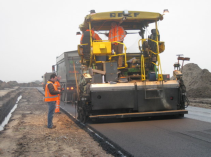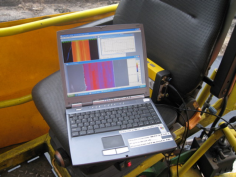
Good compaction practices leads to better quality asphalt. Also, it is crucial for the asphalt paving construction process that the mixture is at the right temperature in order to achieve the right degree of compaction. Previous research has shown that; (a) temperature homogeneity during construction is sometimes problematic, (b) the temperature of the mixture during compaction is crucial for achieving a good quality road, and, (c) there are many factors and processes affecting material temperature during laydown and compaction operations.

 The University of Twente’s Asphalt Paving Research and Innovation unit main aim is to professionalize the road construction industry. One of the topics within the research project involves developing a deeper understanding of the asphalt cooling process and the variation in temperature of the mix during the compaction and the laydown operations. A test section constructed in 2007 provided initial insights into the cooling and variation in temperature of a dual-layer porous asphalt mixture. Infrared cameras were used to provide these and other insights relating to operational behaviour. Although the cameras provided excellent data, the data collection and analysis process was found to be labour-intensive and time-consuming. The research team therefore explored the use of a thermal imaging line scanner with automated data transfer mechanisms as an alternative to the cameras.
The University of Twente’s Asphalt Paving Research and Innovation unit main aim is to professionalize the road construction industry. One of the topics within the research project involves developing a deeper understanding of the asphalt cooling process and the variation in temperature of the mix during the compaction and the laydown operations. A test section constructed in 2007 provided initial insights into the cooling and variation in temperature of a dual-layer porous asphalt mixture. Infrared cameras were used to provide these and other insights relating to operational behaviour. Although the cameras provided excellent data, the data collection and analysis process was found to be labour-intensive and time-consuming. The research team therefore explored the use of a thermal imaging line scanner with automated data transfer mechanisms as an alternative to the cameras.
For more information regarding this project, contact Dr. Joao Santos


